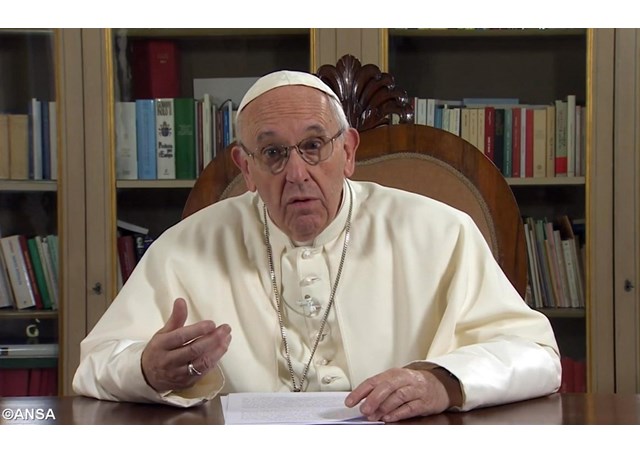
Pope sends video message to CEI conference on Amoris laetitia

Dear brothers and sisters, good morning!
I cordially greet all of you who attend the third International Symposium on the Apostolic Exhortation, Amoris Laetitia, convened by the Office for Pastoral Care of the Family of the Italian Bishops’ Conference.
The theme you have proposed: The Gospel of Love between Conscience and Norm, is of great importance, and can illuminate the path that the Churches in Italy are taking, in order to respond to the desire for family that emerges in the soul of the young generations. Love between a man and a woman is obviously among the most generative human experiences; it is the leaven of a culture of encounter, and introduces to the present world an injection of sociality. Indeed “the good of the family is decisive for the future of the world and of the Church. (Amoris laetitia, 31)” The family born of marriage creates fruitful bonds, which reveal themselves to be the most effective antidote against the individualism that currently runs rampant; however, along the journey of marital love and family life there are situations that require arduous choices, which must be made with rectitude. In the domestic reality, sometimes there are concrete knots to be addressed with prudent conscience on the part of each. It is important that spouses, parents, be not left alone, but accompanied in their commitment to applying the Gospel to the concreteness of life. On the other hand, we know well that “we are called to form consciences, not to pretend to substitute them. (Ibid., 37)”
The contemporary world risks confusing the primacy of conscience, which is always to be respected, with the exclusive autonomy of the individual with respect to the relations that he entertains in life.
As I said recently to the Pontifical Academy for Life, “There are those who even speak of ego-latry, that is, of a true worship of the ego, on whose altar is sacrificed everything, including the dearest affections. This perspective is not harmless: it molds a subject that looks constantly in the mirror, until it becomes incapable of turning its eyes to others and the world. The spread of this attitude has most serious consequences for all the affections and ties of life. (5 Oct., 2017)” This is a “pollution” that corrodes souls and confounds minds and hearts, producing false illusions.
Romano Guardini, in a text on the subject of conscience, indicates the way to the search for the true good. He writes: “From this imprisonment in myself I am free only if I find a point, which is not my ego: a height higher than myself; something solid and working in my interior – and behold! Here we are come to the core [...] that is, to religious reality. That good [...] is something alive. [...] It is the fullness of worth, which belongs to the selfsame living God. (La coscienza, Brescia 1933, 32-33)”
In the very depths of each one of us there is a place wherein the Mystery reveals itself, and illuminates the person, making the person the protagonist of his story. Conscience, as the II Vatican Council recalls, is this, “most secret core and sanctuary of a man. There he is alone with God, Whose voice echoes in his depths. (GS 16)” To the Christian falls the task of being vigilant, so that in this sort of tabernacle is no want of divine grace, which illuminates and strengthens married love and parental mission. Grace fills the amphorae of human hearts with an extraordinary capacity for gift, renewing for the families of today the miracle of the wedding feast at Cana.
Commenting on that Gospel episode, I have been able to say that, “By transforming into wine the water of the jars used ‘for the Jewish rites of purification’ (Jn 2:6), Jesus preforms an eloquent sign: he transforms the Law of Moses into the Gospel, bearer of joy. (Gen. Audience, June 8, 2016)” Jesus points in particular to the medicine of mercy, which cures the hardness of the heart, restoring the relationship between husband and wife, and between parents and children.
Dear Brothers and Sisters, I wish all the best for your work in this Symposium. Let the Church in Italy help to assimilate and develop Amoris laetitia’s content and style; may she contribute to the formation of family group animators in parishes, associations, and movements; may she support the journey of so many families, helping them to live the joy of the Gospel, and to be active cells in the community. I bless you, and I ask you, please, to pray for me.
| All the contents on this site are copyrighted ©. |


